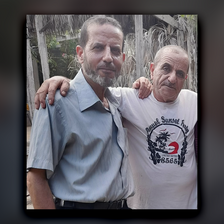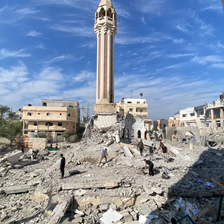The Electronic Intifada 10 July 2024

Israel attacked Gaza City’s gold market on 4 July.
APA imagesMy father often brought me to Askalan, his shop in Gaza City’s gold market, as a child. The shop was named after his birthplace in historic Palestine.
While we were in the market, Jamal – my father – would tell stories about my grandparents and introduce me to his friends.
My father worked as a gold trader for 40 years. He was following in the footsteps of my grandmother, who opened a shop in the late 1940s.
After her death, my three uncles kept up her work, each establishing his own business.
The gold market was part of Souq al-Qaysariyya, Arabic for “Caesar’s market.”
The architecture in the market had survived for many centuries until Israel carried out a major attack on 4 July. The attack also caused considerable damage to the nearby Great Mosque – also known as the al-Omari mosque – which Israel had previously targeted in December.
My childhood memories remain vivid.
To support a large family, my father would work from 9 am to 10 pm – typical hours for gold traders.
At the end of a long and exhausting day, I would greet him with a kiss on the forehead.
We often visited and took photos at the Great Mosque.
We drank carob juice from a stall run by the al-Susi family.
Later, my father continued this tradition with my children.
As I watched him repair gold necklaces, his passion for his work was always evident.
I often joked about not understanding the intricate calculations he undertook when he was setting or negotiating prices.
The call to prayer by the muezzin from the Great Mosque remains etched in my memory.
I had hoped that my own children would experience their own treasured moments in the gold market and that they would understand why the place captivated me. My hopes look elusive now.
“My kingdom”
How can your history vanish in an instant?
What did we do to deserve this?
Israel has wounded us deeply: first by destroying our home and now by trying to erase the precious memories connected with my father’s shop.
My father has been uprooted on three occasions during the current genocidal war. He is now taking shelter in Nuseirat refugee camp, central Gaza.
He is devastated by the loss of his shop Askalan.
“My shop in the gold market may have been small but it was my kingdom,” he said. “It had been my sanctuary since I was 18 and I’m now 59.”
“I miss the routine,” he added. “I miss looking at my mother’s photo on the wall and the embroidered map of Palestine that she made.”
“I miss welcoming customers with coffee and conversation. I worked tirelessly to build up the reputation of the shop and I can’t believe it’s now reduced to rubble. Losing it feels like losing a part of myself.”
Two of my brothers both worked in the shop along with my father. They both have families to support.
“This shop was our livelihood,” my father said.
“I am approaching 60 and how am I supposed to rebuild my life? Isn’t it too late to start again from scratch?”
The author is a writer and translator from Gaza.





